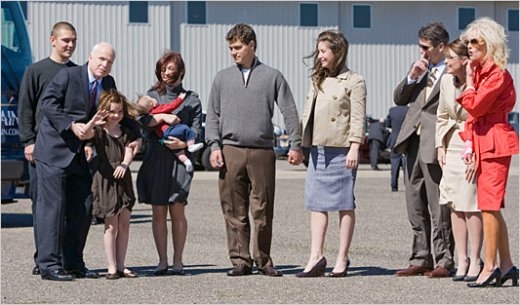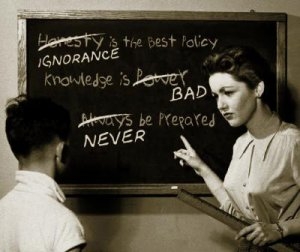
ASSOCIATED PRESS: ANCHORAGE, Alaska — Alaska Gov. Sarah Palin’s husband has refused to testify in the investigation of his wife’s alleged abuse of power, and key lawmakers said Thursday that uncooperative witnesses are effectively sidetracking the probe until after Election Day. Todd Palin, who participates in state business in person or  by e-mail, was among 13 people subpoenaed by the Alaska Legislature. Palin’s lawyer sent a letter to the lead investigator saying Palin objected to the probe and would not appear to testify on Friday.
by e-mail, was among 13 people subpoenaed by the Alaska Legislature. Palin’s lawyer sent a letter to the lead investigator saying Palin objected to the probe and would not appear to testify on Friday.
“The objections boil down to the fact that the Legislative Council investigation is no longer a legitimate investigation because it has been subjected to complete partisanship and does not operate with the authority that it had at the time of its initial authorization,” McCain-Palin presidential campaign spokesman Ed O’Callaghan said. Sarah Palin initially welcomed the bipartisan investigation into accusations that she dismissed the state’s public safety commissioner because he refused to fire her ex-brother-in-law, a state trooper. “Hold me accountable,” she said.
But she has increasingly opposed it since Republican presidential candidate John McCain tapped her as his running mate. The McCain campaign dispatched a legal team to Alaska including O’Callaghan, a former top U.S. terrorism  prosecutor from New York to bolster Palin’s local lawyer. […] Ignoring a legislative subpoena is punishable by a fine up to $500 and up to six months in jail under Alaska law. But courts are reluctant to intervene in legislative matters and the full Legislature must be in session to bring contempt charges, Wielechowski said. The Legislature is not scheduled to convene until January. MORE
prosecutor from New York to bolster Palin’s local lawyer. […] Ignoring a legislative subpoena is punishable by a fine up to $500 and up to six months in jail under Alaska law. But courts are reluctant to intervene in legislative matters and the full Legislature must be in session to bring contempt charges, Wielechowski said. The Legislature is not scheduled to convene until January. MORE
ANCHORAGE DAILY NEWS: GOP vice presidential candidate Sarah Palin is effectively turning over questions about her record as Alaska’s governor to John McCain’s political campaign, part of an ambitious Republican strategy to limit embarrassing disclosures and carefully shape her image for voters in the rest of the country.
Republican efforts include dispatching a former top U.S. terrorism prosecutor from New York, Ed O’Callaghan, to assist Palin’s personal lawyer working to derail or delay a pending ethics investigation in Alaska. The investigation,  known as Troopergate, is examining whether the governor abused her power by trying to remove her former brother-in-law as a state trooper.
known as Troopergate, is examining whether the governor abused her power by trying to remove her former brother-in-law as a state trooper.
O’Callaghan is just part of a cadre of high-powered operatives patrolling Alaska as reporters and Democrats scrutinize every detail of Palin’s tenure in government, plus her family and friends. One strategy: Carefully coordinate any information that’s released. The McCain campaign is demanding that it becomes the de facto source for answers about the operations of Alaska’s government during the past 20 months.
Palin’s normal press secretary, for example, now turns away inquiries from any reporter who isn’t permanently based in Alaska, referring questions to the presidential campaign. Trouble is, some of McCain operatives only recently have arrived in Alaska and struggle to explain Palin’s positions on arcane state issues. MORE

[Photo by STEPHEN CROWLEY]
23/6: “But not once did they look at each other, speak to each other, or in any way acknowledge each other’s physical presence. Not once. For an entire hour. Instead, Bristol stared straight ahead and Levi had the glazed look of a trapped feral animal.” MORE
 COLUMBIA UNIVERSITY: In sum, the articles show that abstinence-only programs contain medical inaccuracies, fail to help young people to change behavior, and conflict with ethical standards. Abstinence-only programs violate young people’s right to accurate information—and also teachers’ and health educators’ rights to answer questions and provide medically accurate information. Many states have now refused to participate in the federal program (25 states as of August 2008) citing concerns about efficacy and accuracy of abstinence-only programs. The federal program provides funding for abstinence-only education and restricts information about contraception and other aspects of human sexuality. “Abstinence-only programs have a broad variety of problems with accuracy, efficacy, and ethics,” Dr. Santelli. “These studies clearly demonstrate that federal promotion of abstinence has failed in its primary goal of helping young people delay initiation of sex, and actually, withholds life-saving information from young people.”
COLUMBIA UNIVERSITY: In sum, the articles show that abstinence-only programs contain medical inaccuracies, fail to help young people to change behavior, and conflict with ethical standards. Abstinence-only programs violate young people’s right to accurate information—and also teachers’ and health educators’ rights to answer questions and provide medically accurate information. Many states have now refused to participate in the federal program (25 states as of August 2008) citing concerns about efficacy and accuracy of abstinence-only programs. The federal program provides funding for abstinence-only education and restricts information about contraception and other aspects of human sexuality. “Abstinence-only programs have a broad variety of problems with accuracy, efficacy, and ethics,” Dr. Santelli. “These studies clearly demonstrate that federal promotion of abstinence has failed in its primary goal of helping young people delay initiation of sex, and actually, withholds life-saving information from young people.”
Refusal states generally cite concerns about the efficacy and accuracy of abstinence-only curricula. Those states also  tend to have progressive governments and strong advocates for comprehensive sexuality education. As of August 2008, 25 states had opted out of Title V funding including Alaska, Arizona, California, Colorado, Connecticut, Delaware, District of Columbia, Idaho, Iowa, Maine, Massachusetts, Minnesota, New Jersey, New Mexico, New York, Ohio, Pennsylvania, Rhode Island, Tennessee, Vermont, Virginia, Washington, Wisconsin, and Wyoming. MORE
tend to have progressive governments and strong advocates for comprehensive sexuality education. As of August 2008, 25 states had opted out of Title V funding including Alaska, Arizona, California, Colorado, Connecticut, Delaware, District of Columbia, Idaho, Iowa, Maine, Massachusetts, Minnesota, New Jersey, New Mexico, New York, Ohio, Pennsylvania, Rhode Island, Tennessee, Vermont, Virginia, Washington, Wisconsin, and Wyoming. MORE
PENN LIVE: The Rendell administration has been steadfast in his opposition to abstinence-only sex education programs. Its position that sex education should also include comprehensive information on contraception and birth control is the correct one, in our view. But for the first time since Gov. Ed Rendell took office in 2003, the state Health Department has decided to apply for $1.7 million in federal grants for abstinence-only programs. Officials say they are doing so out of fairness to schools and community agencies in Pennsylvania who are interested in them.
There are two problems with the administration’s about-face. The first is that these abstinence-only policies may speak to the ideal, but studies have shown that they are largely ineffective in the real world of teen-agers. One study ordered by Congress last year found that despite $176 million in federal outlays for abstinence-only programs, teens who participated were just as likely to have sex as those who didn’t. MORE
 THE GUARDIAN: The Bush administration came under attack yesterday for diverting funds from sex education to abstinence programmes after the first rise in American teenage pregnancy rates in nearly 15 years. The study by the Centers for Disease Control and Prevention (CDC) showed the rate of births to teenagers rose by 3% last year. About 435,000 babies were born to mothers aged between 15 and 19. The results were a sharp reversal from 2005, when the rate hit an all-time low of 40.5 births for every 1,000 teenage girls. It was the first such increase since 1991, when teenage pregnancy rates led to an intense educational campaign on contraception, condom use, and the risk of Aids and sexually transmitted disease. The CDC study gave further weight to arguments by organisations working on reproductive health in America and abroad that the Bush administration was undermining the advances made in the 90s for ideological reasons. Many abstinence programmes are run by evangelical organisations. MORE
THE GUARDIAN: The Bush administration came under attack yesterday for diverting funds from sex education to abstinence programmes after the first rise in American teenage pregnancy rates in nearly 15 years. The study by the Centers for Disease Control and Prevention (CDC) showed the rate of births to teenagers rose by 3% last year. About 435,000 babies were born to mothers aged between 15 and 19. The results were a sharp reversal from 2005, when the rate hit an all-time low of 40.5 births for every 1,000 teenage girls. It was the first such increase since 1991, when teenage pregnancy rates led to an intense educational campaign on contraception, condom use, and the risk of Aids and sexually transmitted disease. The CDC study gave further weight to arguments by organisations working on reproductive health in America and abroad that the Bush administration was undermining the advances made in the 90s for ideological reasons. Many abstinence programmes are run by evangelical organisations. MORE
